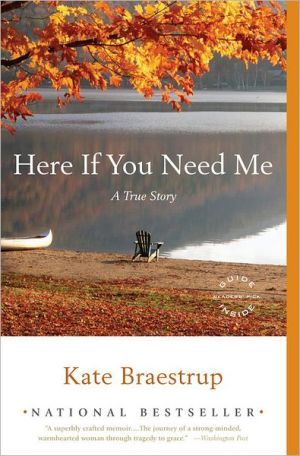Here if You Need Me: A True Story
When the oldest of Kate Braestrup's four children was ten years old, her husband, a Maine state trooper, was killed in a car accident. Stunned and grieving, she decided to pursue her husband's dream of becoming a Unitarian minister, and eventually began working with the Maine Game Warden Service, which conducts the state's search and rescue operations when people go missing in the wilderness. Whether she is with parents whose 6-year-old daughter has wandered into the woods, or wardens as...
Search in google:
Ten years ago, Kate Braestrup, her husband, Drew, and their four young children were enjoying a morning like any other. Then Drew, a Maine state trooper, left for work and everything changed. On the very roads that he patrolled each day, an oncoming driver lost control, and Kate lost her husband. "Stunned and grieving, Kate decided to pursue what had been her husband's dream and became a minister. And soon she found a most unusual calling: serving as chaplain for search-and-rescue missions in the Maine woods, giving comfort to people whose loved ones are missing - and to the wardens who sometimes have to deal with dreadful outcomes. Whether with parents whose six-year-old daughter has vanished into the woods, with wardens as they search for a snowmobiler trapped under the ice, or with a man whose sister left an infant seat and a suicide note in her car by the side of the road, Braestrup provides solace, understanding, and spiritual guidance when they're needed most. Here If You Need Me recounts Kate Braestrup's journey from grief to faith to happiness. The Washington Post - Jane Ciabattari Kate Braestrup's Here if You Need Me can be read as a superbly crafted memoir of love, loss, grief, hope and the complex subtleties of faith. Or it can be read as the journey of a strong-minded, warmhearted woman through tragedy to grace…The meat of the book is Braestrup's description of her work as chaplain to the game wardens who conduct search-and-rescue missions for the state of Maine. And this element of the memoir alone is enough to make it fascinating, as she describes traveling with the wardens in search of murder victims, suicides, straying children and lost hikers. She accompanies the wardens to give comfort to the loved ones of those who are missing, to attend to the remains of those found dead and to minister to the wardens themselves…In Here if You Need Me, she allows us to stand with her while she ministers to those who are lucky enough to have the remarkable, steady, peaceful and wise Kate Braestrup to comfort them.
Here If You Need Me\ \ By Kate Braestrup \ Little, Brown and Company\ Copyright © 2007 Kate Braestrup\ All right reserved.\ ISBN: 978-0-316-06630-3 \ \ \ Chapter One\ A-six-year-old girl has wandered off from a family picnic near Masquinongy Pond, and she remains missing after a long day of waiting. The Maine Warden Service has mounted a search. There are dozens of people combing the woods near the picnic grounds. Some are local guys, volunteers from the community, but most of them are game wardens in green uniforms. Handlers from the warden service K-9 unit have brought dogs trained to find people, and dogs-those braced in the bows of boats drifting over the surface of the pond's marshy edge-trained to alert to the signature scent of a cadaver. \ The parents may or may not know about the cadaver dogs. They may or may not realize that when Chief Warden Pilot Charlie Later's plane buzzes overhead, he is scanning the brown bed of the pond for a small, pale human shape beneath the water.\ The parents do know this much: they love their child, and their child wanders in an inhospitable environment. They know the dark is coming on. They have been told that the Maine Warden Service chaplain has been called. What else could this be about but death?\ Around three in the afternoon, as my kids are trooping into the kitchen, dumping their backpacks in the mudroom, describing their school days, the telephonerings.\ "Your Holiness!" Lieutenant Trisdale roars. "We've got a situation up here by Masquinongy Pond we could use your help with."\ So by four, I am waiting by Chickawaukee Lake. Lieutenant Trisdale has sent a seaplane to fetch me. The lake is a ten-minute drive from my house, so I had time to eat a bowlful of supper's chicken stew and to swallow a Dramamine. I have heard that Charlie Later takes a dim view of wardens who puke in his airplane, and I don't want to test his tolerance.\ My car is parked in the little lot adjoining what passes for a beach, a mud bank that the city of Rockland improves in summertime with sand and a lifeguard. If this were summer, there would be children paddling in the shallows, canoes and kayaks on the water, and-increasingly-"personal watercraft," or jet skis, zooming around.\ But it is late October. The lake, abandoned save for a small flock of migrating mallards, is a placid gray mirror for the autumn afternoon. The sky boasts an archipelago of clouds so perfect in their imitation of islands that in the lee of the largest one, I can make out an inlet where a boat might find secure anchorage.\ I blow on my hands and tuck them into the scratchy woolen armpits of my uniform jacket. I've forgotten my gloves.\ People hear warden service and assume I am a prison chaplain. They picture me at the Supermax, counseling rapists and accompanying the Dead Man Walking to the electric chair. "Maine doesn't have the death penalty," I explain, and in any case, I work with game wardens, not prison wardens. Game wardens are law enforcement officers who work under the Maine Department of Inland Fisheries and Wildlife. Finding a lost child in the woods is among the many useful things these folks know how to do.\ How old a child? "A little girl," the lieutenant had said. Unavoidably, the image of my youngest daughter, age eight, comes to me. Her name is Anne, but her nickname is Woolie, with manifold familial variations (Woolie-Bully, Wooglet, Woo), and her cheek was warm and soft against my mouth when I kissed her good-bye.\ I dial my house to hear my children's voices. There are four altogether. Zachary is the eldest, at fourteen, and the rest follow in reasonably tidy, two-year intervals: Peter is twelve, Ellie is ten, Woolie is eight. "I know. You would think we'd planned them," their father would say, deadpan, when others expressed surprise (or was it dismay?) at the monotonous regularity with which he and I had reproduced.\ Woolie answers the telephone with a complaint prepared: Peter has gone off with the electric pencil sharpener. He won't give it back, and he called Woolie a bastard. Such language is insulting and morally wrong. In addition, it's inaccurate, and I wonder whether this should be an aggravating factor in my adjudication.\ "All right, Woogie-Piggie, I'll talk to him.\ "Peter, share the pencil sharpener," I tell him when he comes on the line. "And no cursing."\ "Okay," says Peter cheerfully. I can hear Woolie shrieking insults in the background. "Peace, Mom-Dude."\ It's early in the search. There's hope-real hope, not the faint hope that families cling to as days drag on.\ By now I know not to bother anticipating or planning for these calls. Hope and grief make a habit of presenting themselves in novel ways every time, and what is required in the way of a tender and appropriate response changes every time as well. It does an anxious family no good at all to have the chaplain arrive worn out with worry or projecting her own parental feelings onto a loss that does not belong to her.\ "Incidents can be rated on a scale of one to ten," a Denver, Colorado, police detective once told me. "Sometime during your career, you might get one or two incidents worth a ten. A bad murder, maybe a young victim, or you shoot somebody, or maybe go through the death of a friend and fellow officer. Those are tens. Most incidents are going to be way down on the scale, like maybe a two or a three. But you know what? I think it's all those little twos, threes, and fours that add up over time. I think those are the ones that get you in the end."\ By my lights, a one is when they find the lost person alive. Ones are good. A ten is-well, a ten is a dead warden, I suppose. Still, line-of-duty deaths are rare, if not quite rare enough. (The Maine Warden Service has the highest number of line-of-duty deaths of any agency in the state, a total of fourteen in the 125 years of the service's existence.)\ Where is the Masquinongy Pond search going to fall on that Colorado detective's scale of one to ten? If the child is dead, it's going to be up there around seven or eight for all the wardens as well as for me.\ Peace.\ My children are all alive and well, if not well behaved. I can count on a solid little hit of adrenaline to clear my head when I arrive on scene. So I kick idly at the gravel, take some deep breaths, blow on my hands, wonder whether Peter and Woolie's issues merit intervention by a shrink, fantasize idly about sailing to the islands in the sky.\ Those ducks had better get a wiggle on; winter is definitely on its way. There are ice crystals forming around the woody stems of the cattails. Turtles, their metabolisms slowed to geologic speed, have hunkered down in the mud for six months of cold coma. It won't be long before the surface of the lake freezes into a solid pane of ice, and anyone who wants to walk on water can. By January it will be thick enough to drive a truck onto, in theory at least. (Every few years, the dive team is called out to retrieve the body of a driver whose estimate of the ice's thickness proved tragically inaccurate.) When the ice is that thick, I'll be willing to let my children skate, maybe.\ Right now, my four children are sitting at the kitchen table, eating the cookies they were supposed to save for after supper, doubtless still arguing over the pencil sharpener or, if they've finished with that, arguing over which video they will watch tonight if Mom is still away and unable to enforce the "no videos on school nights" rule.\ "It would be nice if this little girl turns out to be alive," I suggest out loud.\ Barely audible at first, above the adenoidal agreement of the ducks, a faint buzz grows steadily louder. The warden service seaplane suddenly pops up above the high blueberry barrens at the far end of the lake. Its appearance breaks the island illusion; the clouds are clouds again. The plane gives a friendly wing-waggle and swings toward the water. It is aimed at the wrong shore, but I know by now not to jump and wave. The pilot has to land the plane nose into the wind. When the pontoons have made contact, flinging up twin plumes of white spray and carving sleigh tracks in the lake's silvery surface, Charlie will turn the plane around, and it will grumble gently to my shore.\ Once I'm installed in the passenger seat, Charlie drives the plane hard into the wind, the pontoons skid off the water, and we ascend over the peak of Ragged Mountain.\ "The lieutenant is going to meet us at Masquinongy Pond," Charlie says. "I guess it's not looking so good."\ I nod, looking carefully out the window at distant objects to forestall nausea. Penobscot Bay lies to our right, gleaming blackish blue around the shreds of land that form Islesboro, Northaven, Vinalhaven, Isle au Haut, and myriad little islands. I can pick out details: Owl's Head Light, the break-water in Rockland Harbor, the square hull of the ferry backing out of the slip at Lincolnville Beach. Old mountains, smoothed by glaciers and time, roll off to the north and west. Charlie turns westward and flies behind the sun.\ Charlie's hands rest lightly on the plane's steering wheel. I have an identical yoke in front of my seat that tilts in tandem with his as Charlie makes small adjustments to the variable air. Charlie's father was a warden service pilot too. Charlie grew up flying all over the state, and his relationship with an airplane seems at least as natural as my relationship with my feet.\ And so, though I am prone to motion sickness of all varieties, I do like flying with Charlie. I like to look at Maine from this new angle and from the sky rediscover its familiar features-seacoast, church spires, winding roads, huge tracts of forest, silver lakes, trailer parks, rolling meadows. The tree-lined edges of the pastures below us are accented with a startling yellow, as if a giant artist used his thumb to smudge the vivid dust of a pastel landscape. It takes me a little time to realize that the dusty smudge is where the fallen yellow leaves of the maples have drifted.\ "It's harder when it's a child," Charlie is saying, and I remember again the warmth of my daughter's cheek.\ The parents of the missing girl are standing, stage lit, within a cone of lamplight at the far end of the Masquinongy Pond Recreation Area parking lot. Insects whirl drunkenly above their heads, and among them I note the disconcerting, flitting motion of little brown myotis bats taking their evening meal.\ Perhaps thirty yards away, a modified RV belonging to the Salvation Army casts its own circle of light and supports its own rave of light-drugged insects, its own dance of bats. Through the open back door of the vehicle, I can see Brian Clark, a plump, walleyed veteran of many search scenes, washing pots. He will have spent a long afternoon cheerfully dishing up coffee, doughnuts, and Dinty Moore beef stew to search crews as they came in from the woods. Most of the volunteer searchers have reluctantly gone home for now. In the darkness, they can do no more than spread their scent, contaminating the area that the K-9s will continue searching through the night.\ "I'm Reverend Braestrup," I announce. "I'm the chaplain for the Maine Warden Service."\ "Ralph Moore," the child's father says. "This is my wife Marian. We're not churchgoers." The woman smiles apologetically as if I might have been offended by her husband's abrupt tone.\ "I'm not a church minister." I shrug and smile. His face does not relinquish its skepticism, but Mr. Moore tugs once on my proffered hand, like a man testing the strength of a knot.\ "Actually, I should probably tell you: we're atheists."\ "Ah."\ "No offense."\ "I'm not offended," I say. "What a long, hard day you two have had."\ "Yes," he says.\ "I'm so sorry this has happened to you."\ Mr. Moore looks away, toward the edge growth that fringes the parking lot. "I am too."\ Mrs. Moore stands still, but her eyes scan constantly for signs from the surrounding darkness, her arms wrapped tightly across her chest. It's work to wait this way, aching physical labor.\ "It's miserable to wait," I observe, and she nods, still scanning, her mouth taut.\ Beyond the parking lot, the edge growth gives way to mixed deciduous woodland that rolls on for miles, interrupted only by an occasional swamp or swiftly flowing stream. It's been nine hours since the family dog returned and Alison did not. The Moores are tourists on vacation from a large Massachusetts city, but even if they were locals, the forest and the nearby bog and water would seem increasingly menacing as the hours wore on past mealtime, past bedtime. The people with uniforms, guns, and dogs had arrived in their emergency vehicles, blue lights flashing, as well as airplanes and boats, verifying the seriousness of what is, the awful plausibility of what might be.\ "Look, Reverend," Mr. Moore says, gesturing into the darkness. "I know all these guys have to keep looking. I can tell they are putting on a brave face for Marian here. But you can tell me the truth."\ Unbeliever though he may be, Mr. Moore is not asking the lady in the clerical collar for an objective assessment of a practical situation. He wants the God's honest truth. He wants me to tell him, with all the weight and authority my presence conveys, that his daughter is not dead.\ "Do you think she's dead?" I asked Lieutenant Trisdale after Charlie Later landed me safely on Masquinongy Pond. We were driving to the search scene in his truck, bouncing over the old roads, the lieutenant's paperwork, coffee cups, and collection of cell phones leaping about my knees. Fritz Trisdale has nearly three decades of experience behind his assessment, whatever he says, I will believe.\ Fritz scrubbed thoughtfully at the five o'clock shadow on his jaw. "I'll tell you what, your Reverendship," he said slowly. "I think she's still okay, to be honest with you. It's not like the kid was retarded or suicidal or something. She's just good and lost. Those woods have been cut over so many times that there's plenty of scrub and low growth to keep her hidden from us. Hell, you'd practically have to step on someone to find 'em in there. She's probably scared of the voices she hears, if she hears 'em at all. I think she's alive. Ronnie Dunham's bringing his dog Grace up this evening, and Grace'll have a fresh nose." Fritz stopped and gave it another thought but came to the same conclusion. "Yeah," he said. "I think we're going to find her."\ "Listen," the child's father is saying to me. "I'm an engineer. I work with statistics. You don't have to bullshit me."\ His wife is holding onto my hand, tightly, and her hand is cold. She turns her eyes to me as her husband continues: "I know that the longer this search goes on, the greater the chances are that my little girl is dead." Mrs. Moore flinches sharply at the word, and grips my hand even more firmly. Later my knuckles will ache, and I'll find the marks of her fingernails in my palm.\ "I have been on many searches with the wardens," I answer him. "These guys are good at what they do. They have a lot of experience between them. And I've been with them on searches where they really don't think they are going to find somebody alive."\ I pause and both parents lean closer, as if my voice might suddenly soften beyond the reach of their ears, but I speak boldly. "If the wardens have told you that in their professional opinion they think they will find your daughter alive, I believe we're going to do just that."\ Mr. Moore's knees visibly wobble. Mrs. Moore gives forth with a weak exclamation, and her hand softens in mine.\ Oh, please, Jesus, let this be true. Let the little girl be alive.\ If it isn't true, then one of the searchers will find the body. It is a small body to begin with, no more than fifty-five pounds according to the report, and it will have dwindled in death. There will be no vital signs, no spring of skin or tapping pulse beneath the warden's gentle fingers at wrist or throat, no warmth. The clothing will correspond to the description each searcher carries: khaki pants, light blue jacket, blue sweatshirt with a picture of Elmo on the front, gym socks, and Teva sandals.\ (Continues...)\ \ \ \ \ Excerpted from Here If You Need Me by Kate Braestrup Copyright © 2007 by Kate Braestrup. Excerpted by permission.\ All rights reserved. No part of this excerpt may be reproduced or reprinted without permission in writing from the publisher.\ Excerpts are provided by Dial-A-Book Inc. solely for the personal use of visitors to this web site. \ \
\ From Barnes & NobleBarnes & Noble Discover Great New Writers\ Kate Braestrup was living an enviably happy life as a wife and mother, when one morning her beloved husband was killed in a traffic accident. Fighting her grief, she decided to follow his dream -- and became a chaplain to the game warden service in their Maine community. \ \ Game wardens, it turns out, are a special breed, and they need to be. They're just as likely to be called to the scene of a drunk driver, a suicide, or a murder as they are to a search, sometimes successful, for a child missing in the woods. And the bonds these preternaturally decent, if gently impious, officers forge with Braestrup presage the quick yet deep connections she must make to help grieving family members face a sudden, devastating loss -- one she knows well. \ \ What's most remarkable about Here if You Need Me is that the comfort and solace Braestrup strives to impart to those she encounters is also conferred upon her readers. Her narrative is insightful, funny, and heartfelt. She has faith, certainly, and a belief that true grace lies in the facility for gratitude. In fact, her memoir does everything a good memoir should: It makes you smile and cry and feel truly grateful that Braestrup decided to share her experiences -- both joyous and painful -- for the betterment of those who would find it. (Fall 2007 Selection)\ \ \ \ \ Jane CiabattariKate Braestrup's Here if You Need Me can be read as a superbly crafted memoir of love, loss, grief, hope and the complex subtleties of faith. Or it can be read as the journey of a strong-minded, warmhearted woman through tragedy to grace…The meat of the book is Braestrup's description of her work as chaplain to the game wardens who conduct search-and-rescue missions for the state of Maine. And this element of the memoir alone is enough to make it fascinating, as she describes traveling with the wardens in search of murder victims, suicides, straying children and lost hikers. She accompanies the wardens to give comfort to the loved ones of those who are missing, to attend to the remains of those found dead and to minister to the wardens themselves…In Here if You Need Me, she allows us to stand with her while she ministers to those who are lucky enough to have the remarkable, steady, peaceful and wise Kate Braestrup to comfort them.\ —The Washington Post\ \ \ Publishers WeeklyBraestrup's narration about her work as a chaplain with Maine's fish and game wardens is filled with the same comfort she offers those she ministers to. Her friendly, easygoing northeastern-accented voice is instantly soothing whether she is talking about the happy outcome of a search-and-rescue mission or her husband's tragic death, which spurred her on the road to her new job. Her reading has an often prayerful cadence, though she goes easy on Bible quotation and her discussions of theological issues are so wise and well-thought-out that even the nonreligious won't be put off. Mixed with cute stories about raising her four kids, she offers keenly observed anecdotes about what she's seen on the job, accompanying wardens as they pick up fishermen without permits or search for kids lost in the woods. "My job is so cool," Braestrup repeats often, and her enthusiasm comes through clearly in her lively narration. Whether listeners are in need of a reassuring voice, Braestrup's brief memoir embraces in a most welcome, heartwarming way. Simultaneous release with the Little, Brown hardcover (Reviews, Apr. 23). (Aug.)\ Copyright 2007 Reed Business Information\ \ \ \ \ Library JournalBraestrup understands that women aren't always allowed the luxury of solitude during the grieving process. After her husband, Drew, a Maine state trooper, was killed in a car accident, she was left to explain the loss to their four children while trying to maintain her own equilibrium. Amazed by the outpouring of kindness-which included brownies from a neighbor with whom she had only a nodding acquaintance and enough casseroles to fill the family freezer-Braestrup decides that God can be found where there is love. Drew had intended to become a Unitarian Universalist minister when the time came for him to retire, continuing to be of service to his brothers and sisters in arms. In the midst of the many changes in her life, Braestrup chose to attend divinity school with the idea of completing Drew's dream. Here If You Need Meis the story of how she makes her husband's dream her own and eventually becomes the chaplain for Maine's Wildlife and Game Service. Braestrup's strength is evident throughout the memoir, which is by turns funny, tender, and frightening, yet always reinforced by the undercurrent of great love. Here If You Need Meis recommended for public libraries.\ —Pam Kingsbury\ \ \ \ \ \ Kirkus ReviewsThe life-and-death experiences of the first female chaplain in the Maine Warden Service. Novelist and journalist Braestrup (Onion, 1990) became a Unitarian Universalist minister after her husband was killed in a car accident. He had planned to join the ministry after he retired from the Maine State Police, and she decided to honor his memory by achieving his goal and devoting herself to law-enforcement-related service. Her stories of search-and-rescue operations in the Maine woods make it clear that she quickly became very good at helping others. When disaster struck, she traveled with the wardens, clad in the same uniform but with a plastic clerical collar attached, sharing their jokes, their cold and discomfort and their bad meals. Though they gently taunted her with such nicknames as "Holy Mother" and "Your Holiness," the wardens seemed to enjoy having Braestrup along and to value her presence. It freed them up to do their own jobs when she reached out to provide on-the-spot comfort to the parents of a lost child, the wife of a man who disappeared while ice fishing, as well as other frightened, stressed-out and grief-stricken people. Interspersed among accounts of violent death and dismemberment in the wilderness are sweeter, sadder essays: detailed recollections of preparing her husband's body for cremation; confessions of her paranoia about their four children's safety; and surprisingly unorthodox thoughts on heaven and hell, miracles, prayer and Jesus. Braestrup's occasionally self-mocking prose conveys a warmth and humor that lighten some heartbreaking, even gruesome scenes. Her characters and story lines seem custom-made for a high-quality television series. A heartening bookabout applied theology by someone practicing her faith in a rough-and-tumble world.\ \







